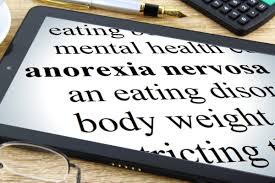What is anorexia nervosa?

Carrying on from my previous blog post that discusses eating disorders in general, this one will look at anorexia nervosa (anorexia) in more detail. Out of the four eating disorders, anorexia is the least common, but it has the highest mortality rate of any psychiatric disorder in adolescence. It is a serious mental health condition and therefore it is again important to understand what it is, the symptoms and signs that someone has it portrays, and the treatments that can be given for it.
Anorexia is a serious mental health condition where people who have it often have a distorted image of their bodies, such as thinking they are larger than they actually are, and of how other people see them. People with the condition have an extreme fear of gaining weight, and therefore attempt to keep it as low as possible. This may be carried out by exercising too much, not eating enough food, or both. This then makes a person very ill because of the lack of food they consume.
Like with eating disorders in general, males and females of any age can develop anorexia, but it is most common in young women and usually starts when they are in their mid-teenage years. It is also increasingly being reported by children, men and boys, and women over the age of 40.
There are many symptoms of anorexia, and more in-depth information can be found in the links within the references section, but they can be split into physical and behavioural symptoms and signs. Physical symptoms include severe weight loss, feeling dizzy, having difficulty sleeping, feeling tired, being irritable/moody, experiencing stomach pains, having difficulty concentrating, and growing a soft and fine hair (called lanugo) all over the body. Behavioural signs of anorexia include a person eating only food which has low calories, not eating meals, having a pre-occupation with body weight, having a fear of being fat and pursuing being thin, avoiding eating with other people, cutting food into small pieces to make it less obvious they have eaten very little, hiding food, exercising excessively, having obsessive behaviour and rituals around eating, and socially withdrawing.
Going to see a GP as soon as possible about the possibility of having anorexia is the first step, and they can then make a referral to an eating disorder specialist or specialist team. In most cases of people with anorexia, it can be treated in outpatient facilities, with more intensive inpatient units used if the condition gets worse, if the person’s health doesn’t improve, or because of other high risks to the person’s physical health. Talking therapies can be used to help treat anorexia, with the aim being to encourage healthy eating, reducing the risks to the person’s physical and psychological wellbeing, and to help their recovery by allowing them to develop ways of coping with the thoughts and feelings behind the disorder. The therapies help the person to identify the fears and feelings they have that cause them to stop eating, and to develop a healthier attitude towards food and their body.
The therapies that could form part of the treatment include Cognitive Behavioural Therapy (CBT), Interpersonal Psychotherapy (IPT), and family interventions focused on eating disorders. Family interventions are recommended as part of the treatment for children and adolescents, and overall the most useful therapy type will vary depending on the person’s circumstances. The talking therapies can last up to twelve months or more depending on the severity and persistency of the anorexia.
As shown above, someone with anorexia can show different signs and symptoms, and there is a lot of support and help available. Please have a look at the information in the references section below, which also includes a link to support helplines and services.
Sarah Keeping MBPsS MSc PgDip GDip BA (Hons) Cert HE
Follow Sarah on twitter at @keepingapproach, facebook at @keepingapproach, and on instagram at @thekeepingapproach
Follow E-therapy on social media:
Facebook – @Etherapy
Instagram – @EtherapyToday
Twitter – @EtherapyToday
References
https://www.anorexiabulimiacare.org.uk/about/statistics
https://www.nhs.uk/conditions/anorexia/
https://www.mentalhealth.org.uk/a-to-z/a/anorexia-nervosa
https://www.beateatingdisorders.org.uk/types/anorexia/treatment
https://www.beateatingdisorders.org.uk/support-services


